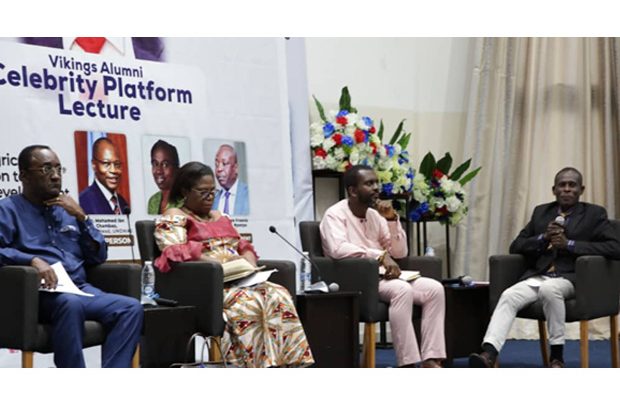The Panel at the public lecture
Flagbearer hopeful of the New Patriotic Party (NPP), Dr. Owusu Afriyie Akoto, has proposed a new innovative business model for the country to succeed in diversifying its agriculture.
According to him the new business model should be driven by a government structure, supply chain logistics and market access, big data and technology for evidence-based decision making, research and development, strengthening both input and output market systems and human development.
But above all, he said, the political will to execute this innovative new business model should never be compromised.
He was speaking at the Vikings Alumni Celebrity Platform Lecture organized by the Mensah Sarbah Hall Alumni Association on the occasion of the 60th Hall anniversary themed, “Exploiting Agriculture Diversification to Fund Economic Development in Ghana”.
Dr. Owusu Afriyie Akoto noted that the investments needed to achieve sustainable food systems will be non-negotiable in his vision to transform agriculture for the prosperity of all.
Dr. Owusu Afriyie Akoto said should he be elected the Flagbearer of the NPP and subsequently as the President of Ghana, he will create an Agricultural Management Team (AMT) to drive agricultural development.
The Agricultural Economist further noted that to improve supply chain logistics and expand market access, infrastructure projects such as feeder roads, hospitals, housing, rural electrification, irrigation, and storage will be integral in the agricultural transformation agenda.
“It is essential that policy makers, farmers, and actors in the value chain are trained to access the benefits of data for decision making. Precision agriculture that gives farmers the ability to use inputs more effectively to increase productivity will be prioritised,” he said.
Dr. Owusu Afriyie Akoto, spoke of his vision to develop and strengthen both input and output market systems.
“I shall establish an appropriate regulatory framework to leverage private-sector investment across all sectors and promote the efficient distribution of agro-inputs.
He stressed that another key factor will be to ensure human development.
“A comprehensive strategy will be adopted to develop the human capital needed to take innovations to scale along the agricultural commodity value chains.
This will include farmer field schools, demonstration plots, development of agropreneurs, training of agricultural extension agents, and value chain actors to improve efficiency.
We shall also support social development programmes aimed at reducing illiteracy among rural households and farmers to increase the adoption of new technologies. We shall develop curricula in our educational system that shall equip students with the mindset, knowledge, and skills for agricultural education,” he said.
Dr. Owusu Afriyie Akoto further stressed the need for the creation of common wealth for the good of ordinary Ghanaians.
“We must engage to create common wealth that sees to the needs of the common people. There is a need for a new innovative business model, value addition, productive stakeholder engagement, including the youth, smallholder farmers, and large-scale farmers, and everyone in the agri-business value chain for adequate and affordable food and high value export to fully benefit from the gains of the sector.
Dr. Owusu Afriyie Akoto reiterated that “Agriculture is the means to our end”, adding that the Tree Crop Development Authority (TCDA), the Grains Development Authority (GDA), and other commodity institutions can together substantially expand our export earning capacity to fund industrial development and finance social sectors including health, education, housing and roads.
Expanding our export earning capacity should reduce our dependence on external borrowing to fund our economic development – as has been the case since independence,” he added.
A Business Desk Report


